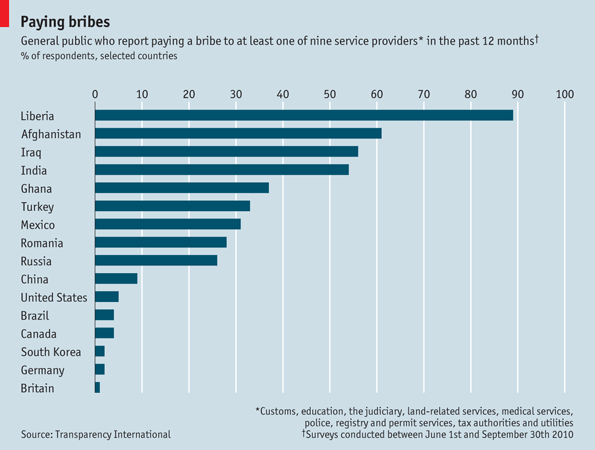The connection between bribery and property rights
Transparency International has released its annual Global Corruption Barometer. Surprisingly, it shows that less than 10 percent of Chinese people paid a bribe in the last 12 months, ranking China among the less corrupt countries in the world.

Broadly, the chart shows that countries with a higher level of economic development have a lower level of corruption. Following this logic, since China is developing fast its ranking is about right. But many people are unconvinced. They think the ranking underestimates the level of corruption in China. And in fact, the key to understanding corruption is not to relate it to the level of economic output, but to the development and maturity of institutions.
The key to maximizing commercial efficiency lies in the transformation of institutions, according to the Nobel Prize winning economist Douglass North. The essential transformation from a traditional economy to a modern economy is the introduction of impersonal exchange – the basic principle of the market economy. In a market economy, by voting with our feet we realize the most effective and rational allocation of resources. But in today's China, too much power remains in the hands of high status individuals. If you want to get things done you have to deal with these individuals. And bribery is the inevitable result.
China is in a period of social transition from a pre-modern to a modern economy. But the government chose a gradualist path to economic reform that did not immediately get rid of personal factors in trade. This left space for rent-seeking and nepotism. As a result, ordinary people in China have become very familiar with the practice of bribery.
If we simply take the view that commercial efficiency is in inverse ratio to corruption, the way out might seem to be to develop the economy. And naturally our model of economic development is the developed countries. But history has proved that simply repeating the experience of developed countries is not only impossible, but may also have negative consequences. From the perspective of institutional economics, the way to curb bribery lies in developing institutional arrangements that underpin impersonal exchange.
 0
0 






